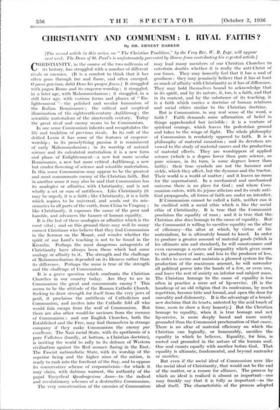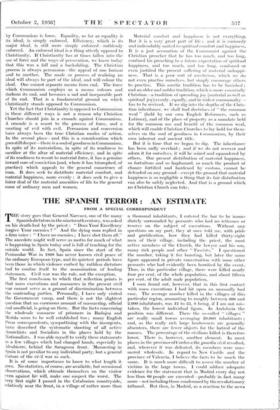CHRISTIANITY AND COMMUNISM : I. RIVAL FAITHS ?
By DR. ERNEST BARKER
[The second article in this series, on " The Christian Tradition," by the Very Rev. W . R. Inge, will appear next week. The Dean of St. Paul's is unfortunately prevented by illness from contributing his eap:,,cted article.] CHRISTIANITY, in the course of the two millennia of its history, has struggled with a number of different rivals or enemies. (It is a comfort to think that it has often gone through fire and flame, and often emerged. 0 passi graviora, dabit Deus his quoque finem.) It struggled with pagan Rome and its emperor-worship ; it struggled, in a later age, with Mahommedanism ; it struggled, in a still later age, with various forms and phases of " En- lightenment "—the polished and secular humanism of the Italian Renaissance ; the critical and sceptical illumination of the eighteenth-century Aufkliirung; the scientific materialism of the nineteenth century. Today the great rival and enemy seems to be Communism.
In one sense Communism inherits and recapitulates the lift and tradition of previous rivals. In its cult of the deified Lenin it has some of the features of emperor- worship ; in its proselytising passion it is reminiscent of early Mahommedanism ; in its worship of natural science and its calculated materialism it is a new form and phase of Enlightenmenta new but more secular Renaissance, a new but more critical Atifklarung, a new but cruder flowering of science and scientific materialism.
In this sense Communism may appear to be the greatest and most consummate enemy of the Christian faith. But in another sense it may also be said that Communism has its analogies or affinities_ with Christianity, and is not wholly a set or sum of antitheses. Like Christianity (it may be urged), it is a faith ; like Christianity, it is a faith which aspires to be universal, :and sends' out its mis- sionaries to all parts of the earth, from China to Uruguay ; like Christianity, it espouses the cause of the poor and humble, and advances the banner of human equality.
It is the last of these analogies or affinities which is the most vital ; and on this ground there may well be many earnest Christians who believe that they find Communism in the Sermon on the Mount, and wonder whether the spirit of our Lord's teaching is not to be found in the Kremlin. Perhaps the most dangerous antagonists of Christianity have always been those which had some analogy or affinity to it. The strength and the challenge of Mahommedanism depended on its likeness rather than its difference. Perhaps the same is true of the strength and the challenge of Communism. .
It is a grave question which. confronts the Christian Churches in our country today. Are they to see in Communism the great and consummate enemy ? This seems to be the attitude of the Roman Catholic Church. Seeking to draw strength for itself from the very jaws of peril, it proclaims the antithesis of Catholicism and Communism, and invites into the Catholic fold all who would fain escape from the wolf of Communism. But there are also other would-be saviours from the menace. of Communism ; . and our. English Churches, both the Established and the Free, may find themselves in strange company if they make Communism the enemy par. excellence. The Nazi racial State, with its apotheosis of a pure V olksium (hardly, at bottom, a Christian doctrine), is inviting the world to rally to its defence of Western civilisation against the Red menace flaring in the East.. The Fascist nationalistic State, with its worship of the superior being and the higher aims of the nation, is ready to rush into the forefront of the fray, and to oppose. its conservative scheme of corporativism—for which • it _ may claim, with dubious warrant, the authority of the papal Encyclical QuadrageSimo Anno-r-to ...the radical and revolutionary schemes of a destructive Communism.: The very concatenation of the enemies of Communism: may lead many members of our Christian Churches to entertain doubts whether it is really the anti-Christ of our times. They may honestly feel that it has a soul of goodness : they may genuinely believe that it has at least as much of affinity with Christianity as it has of difference. They may hold themselves bound to acknowledge that in its spirit, and by its nature, it, too, is a faith, and that in its content, and by the substance of its teaching, it is a faith which carries a doctrine of human relations and social ethics similar to the Christian doctrine.
But is Communism, in any real sense of the • word, a faith ? Faith demands some affirmation of belief in things apprehended but invisible : it is a venture of spiritual courage, which leaves the pedestrian ground and takes to the wings of flight. The whole philosophy of Communism is resolutely opposed to faith. It is a philosophy of material causation ; and its devotees are vowed to the study of material causes and the production of material effects. They are worshippers of applied science (which is a degree lower than pure science, as pure science, in its turn, is some degrees lower than faith) : their true symbols are not the hammer and sickle, which they affect, but the dynamo and the tractor. Their world is a world of matter ; and it leaves no room for the supernatural. In a mechanical and mechanised universe there is no place for God ; and where Com- munism enters, with its jejune atheism and its crude anti- God propaganda, all forms of faith are under an interdict.
If Communism cannot be called a faith, neither can it be credited with a social ethic which is like the social ethic of Christianity. It is true that the Communist proclaims the equality of man ; and it is true that the; Christian also does homage to the cause of equality. But? the Communist is willing to sacrifice equality on the altar of efficiency—the altar at which, by virtue of his materialism, he is ultimately bound to kneel. In order to produce a greater amount of material goods (which is his ultimate aim and standard), he mill countenance ,and even encourage a system of inequality which gives more to .the producer of more, and less to the producer of less. In order to secure and maintain a planned system for the production of the maximum amount, he will surrender all political power into the hands of a few, or even 'one, and leave the rest of society an inferior and subject mass. The Christian homage to the cause of equality is too often in practice a mere act of lip-service. (It is the handicap of an old religion that its confessions, by much repetition, become trite and formal, and open the door for unreality and dishonesty. It is the advantage of a brand- new doctrine that its tenets, untested by the acid touch of time, seem to show a fiery honesty.) But the Christian homage to equality, when it is true homage and not lip-service, is more deeply. based and more surely grounded than the Communist proclamation of that cause. There is no altar of material efficiency on which the Christian can logically, or honourably, sacrifice the equality in which he believes. Equality, for him, is rooted and grounded in the nature of the human. soul. One soul counts equally with another before God. That equality is ultimate, fundamentals and beyond surrender- or sacrifice.
But even if the social ideal of. Communism were like the social ideal of. Christianity, that would not. be the end of the matter, or- a reason for alliance. The process by which an- ideal is realised is almost as important—one may, frankly say that it is fully as important—as the ideal itself. The. characteristic of the process adopted by Communism is force. Equality, so far .as equality is its ideal, is simply enforced. Efficiency, which is its major ideal, is still more simply enforced—ruthlessly enforced. An enforced ideal is a thing utterly opposed to Christianity. If Christianity has at times fallen into the use, of force and the ways of persecution, we know today that this was a fall and a backsliding. The Christian process is always persuasion—the appeal of one humari soul to another. The mode or process of realising an ideal will always be part of the ideal, and will colour the ideal. One cannot separate means from end. The force which Communism employs as a means colours and darkens its end, and becomes a sad and inseparable part of its end. That is a fundamental ground on which Christianity stands opposed to Communism.
Yet the fact that Christianity is opposed to Communism in these different ways is not a reason why Christian Churches should join in a crusade against Communism. A crusade is a resort to the process of force, and a meeting of evil with evil. Persuasion and conversion have always been the true Christian modes of action. In the second place—and this is a consideration which goes still deeper—there is a soul of goodness in Communism. In spite of its materialism, in spite of its readiness to sacrifice at the altar of material efficiency, and in spite of its readiness to resort to material force, it has a genuine inward core of conviction. (and, where it has triumphed, of practice) which appeals to the general conscience of man. It does seek to distribute material comfort, and material happiness, more evenly : it does seek to give a fairer deal of the material amenities of life to the general mass of ordinary men and women. Material comfort and happiness is not everything. But it is a very great part of life ; and it is curiously and indissolubly united to spiritual comfort and happiness. It is a just accusation of the Communist against. the Christian preacher that he has too much, and too long, confined his preaching to a future expectation of spiritual happiness, and too much, and too long, condoned or even justified the present suffering of material unhappi- ness. That is a poor sort of asceticism, which we do not even practise ourselves, but simply encourage others to practise. This ascetic tradition has to be banished ; and an older and nobler tradition, which is more essent Christian—a tradition of spreading joy (material as well as spiritual joy) evenly, equally, and in widest commonalty-- has to be revived. If we dig into the depths of the Chris- tian inheritance, we shall find doctrines of " the common weal " (held by our own English Reformers, such as Latimer), and of the place of property as a mandate held for the common use and benefit of the common weal, which will enable Christian Churches to lay hold for them- selves on the soul of goodness in Communism, by their own inherent and ancient title.
But it is time that we began to dig. The inheritance has been sadly overlaid ; and if we do not recover and adorn it for ourselves, it will be seized and squandered by others. Our present distribution of material happiness, so fortuitous and so haphazard, so much the product of chance fortified and hardened by custom, cannot be defended on any ground—except the ground that material happiness is so negligible a thing that its fair distribution can also be safely neglected. And that is a ground which no Christian Church can take.











































 Previous page
Previous page